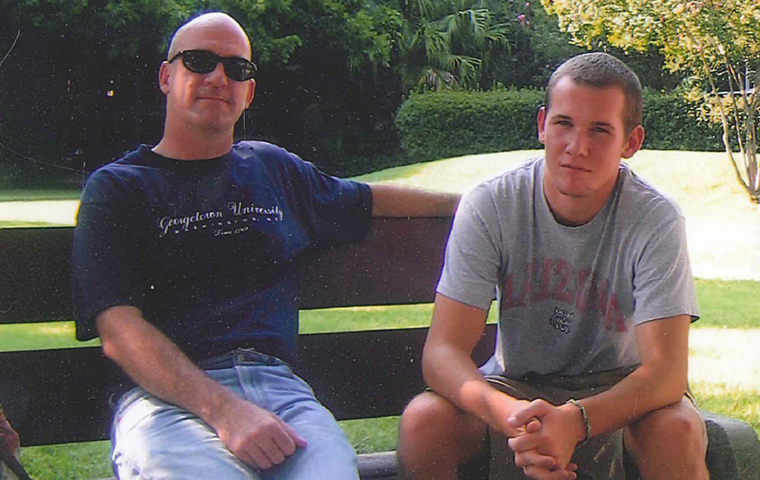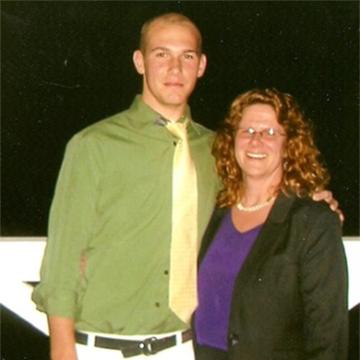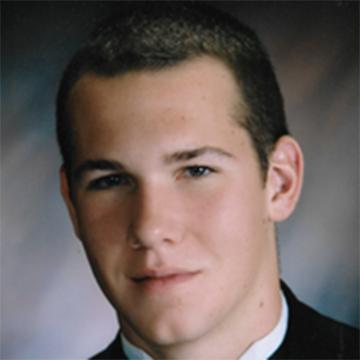
Tomorrow Never Knows
Chris was too young to die. But not to save five lives.
“Who wouldn’t want this body?”
A decade ago, that was 19-year-old Christopher Gregory’s mischievous way of explaining to his parents why he had become an organ donor when he renewed his Maryland driver’s license. He was chatting with his family on a break during his second semester at Loyola New Orleans. His father, Eric Gregory, would recall the wisecrack years later for two reasons: First, it captured his son’s sense of humor. And second, it was tragically prescient.
Just days after he made the remark, Chris died suddenly from a ruptured brain aneurysm.
In the days following his death, the Gregory family—who had flown from Baltimore to New Orleans to be with their son—grappled with their grief and shock. Meanwhile, five near-death strangers on the organ transplant waiting list got a call. They dropped what they were doing—leaving a doctor’s office, making final financial arrangements, getting ready for a cookout at work—and rushed to nearby hospitals—in Shreveport, Louisiana, and New Orleans, and in Jacksonville, Florida. Chris’s lungs, heart, liver, pancreas, two kidneys, corneas, and tissues were recovered, then flown or driven to hospitals for transplantation. Recipients included a then-63-year old family member and executive with the Bacardi Rum dynasty, who flew to Jacksonville from the Bahamas, as well as a 46-year-old entrepreneur, a 64-year-old retired office manager, and two former military men in their 50s—all from towns across Louisiana.

Chris Gregory and his mother, Grace
Even in his despair, Eric Gregory, a UPS risk manager now based in Phoenix, was impressed by the complex logistics, timing, and rapid coordination required to pull off this uncommon five-way organ donation. He prayed that someday he would be able to meet the people receiving the gift of his son’s organs.
Eric also was acutely aware of the professionalism of the people who helped, and the many kindnesses he and his family—sons John and Colin, and wife Grace—received in their darkest hour. There was the Cajun male nurse who teared up as he conducted the final, unsuccessful test for brain activity in Chris. There was the surgeon who confided that he had lost his own son from a brain aneurysm. There were the Jesuit priests from Loyola New Orleans, always present, offering holy sacraments and support. There were Loyola students who filled the waiting room. And there were the nurses who, silent but with tears streaming down their faces, lined the hallway as Chris’s family said goodbye to him.
Marveling at the drama and humanity packed into those few days, the father would think often, “This is a story that should be told.”
So, nine years later, Eric put the story on the page. In 2017 he self-published All My Tomorrows: A Story of Tragedy, Transplant and Hope. The book chronicles in compelling detail the story of Chris’s life and death as it affected his friends, campus community, medical personnel, family, and others.
Chris was big in stature as well as in heart: 6 feet, 4 inches, nearly 200 pounds. His shoes were size 14. He was exuberant; while visiting a friend, he once launched himself into bed with his friends’ parents to watch TV with them, ignoring their shocked laughter—as if this were the most normal thing in the world. He had shockingly bad fashion sense, probably thanks in part to his color blindness. He was a kind and clever jokester who occasionally underachieved in school in favor of having a good time. Guitar and baseball were his loves. He charmed his friends’ families into giving him “refrigerator rights” at their homes.
The book also weaves in stories from the people given a new chance at life thanks to Chris. Eric was able to meet them in person, to interview them—and befriend them. The reader learns intimate details, such as how many of the recipients went through agonizing “false alarms” prepping for organs that ended up not working out—in Jorge Bacardi’s case, only hours before he was matched with Chris’s lungs. Or how some recipients grappled with ethical questions like whether someone over 60 should receive a young man’s organs. Or how kidney recipient Nic Whitacre was literally sent home to die the day Chris’s death certificate was signed; Whitacre was one of several recipients who were saying their final goodbyes when they got “the call.”
“I didn’t realize how close to death they were until I met them,” says Chris’s mother, Grace. “They were looking at death at the same time that Chris was looking at death.”
In writing the book, Eric said he wanted to bring to life the tales of how these lives and hopes intersect.
“If their lives matter, then Chris’s life mattered and his sacrifice means something,” he reasoned. “Without the miracle of organ transplantation, I’m just another grieving parent who can’t wait for Father’s Day to end. It all speaks to the integrity and dignity of human life. We’re all in this together.”
Major Motion Picture
We are also about to see Chris’s story on the big screen. A few years ago, now-healthy Jorge Bacardi and Man on Firemovie producer Conrad Hool wound up on the same Pacific cruise and got to talking. Chris’s story is being made into a motion picture titled 2 Hearts. Filming, in both Vancouver and Hawaii, started in June and was expected to wrap up July 31. It stars up-and-coming teen heartthrob Jacob Elordi as Chris, and will focus largely on the stories of Chris and Jorge, who will be played by Designated Survivor actor Adan Canto.
Conrad Hool’s daughter, Carla, is the casting director. She won an industry award for her casting in the blockbuster animated film Coco and has received praise for her efforts to expand roles for Latinx actors in films. Eric is being played by Tahmoh Penikett, best known as Helo on Syfy’s Battlestar Gallactica. Actress Kari Matchett plays Grace.
The journey to filming had some bumps. Eric, Grace, and the Bacardis spent several years going back and forth with a series of writers over screenplays that didn’t quite ring true. For instance, the first writer had Chris calling his friends “bro”—which he didn’t do. The writer also had Chris taking selfies. “Christopher would kick his own ass before he’d take a selfie,” says Eric, and he laughs. “Christopher was not Pee-wee Herman, he was Steve McQueen. He didn’t let his guard down in front of people he didn’t know.”
Hool was sympathetic. His niece, Veronica Hool, an actor and screenwriter, ultimately sat down with Eric’s book and tried to really channel Christopher.

“She nailed it,” Eric says. “The final version made me laugh, and it made me cry.”
Grace says she cherishes having Chris’s memory kept alive—through the book, through organ recipients, and now the movie—although it is bittersweet. “As a parent, you are so proud of your son for saving five lives, probably countless lives with tissue donation we don’t even know about,” she says. “We are reminded of Chris every time we correspond with any of his organ recipients. It is a complete blessing.”
This Whole Person
Eric also says the people he has met on this journey brought him back to a life of purpose. “I thought I had buried my passion the same day I buried Chris,” he says. Now, “there are two things I’m really passionate about: organ donation and the Society of Jesus. The people involved in both are good, decent people, doing good things in the world. I want to be a stronger advocate for both.”
The Jesuit roots run deep in the Gregory family. Eric received his bachelor’s and master’s degrees from Georgetown University, where eldest son John also received his master’s degree. John and middle son Colin both went to Gonzaga High School in Washington, D.C., and Colin graduated from Loyola New Orleans, which Chris was attending when he died.
Eric said his family greatly admires the Jesuit ethos of educating the whole person, and “meeting people where they are”—even if that means entering messy emotional situations, such as in a dying teen’s room at Tulane’s medical center. “It seems at every big event in the Gregory family, there’s been a Jesuit in the room,” he says.
Grace says she will always be grateful that Jesuits Jim Caime, S.J., M.Div. ’02, and Ted Dziak, S.J., were there for whatever the family or their close friends needed, be it lodging, food, or solace. “They led us in prayer and they prayed with us, and with their presence I felt completely carried,” she says. “In that regard, I didn’t worry about anything.”
Eric wrote about how Caime frequently accompanied Colin outside to the medical center grounds to smoke Parliaments when the stress got unbearable. “Leave it to a Jesuit to know just what to do at a moment like that,” Gregory wrote in his book. “Colin didn’t need any lectures on scripture or lessons on grace or the sacraments… He needed someone to share a cigarette with.”
Theological Studies
Eric Gregory’s quest to become a better advocate for organ donation also led him to sign up for an online master’s of theological studies degree though SCU’s Jesuit School of Theology in 2017.
“If you get a chance to go to school at the Jesuit School of Theology, and that’s one of your passions, why wouldn’t you do it?” he says. And a theology degree provides the foundation he wants to tackle head on the huge moral, ethical, and social issues that arise with organ donation. He’s also become, as he puts it, “unapologetically opposed” to war and the death penalty, as well as abortion and physician-assisted suicide. “I don’t want to judge anyone who isn’t,” he says. “But I want to find what we can do to make each unnecessary. And let’s work to get there.”
As he explains, the tragedy of losing his son has made Eric feel protective of life in all its forms. “Once you’ve picked out a casket for your own child, you look at life differently,” he says.